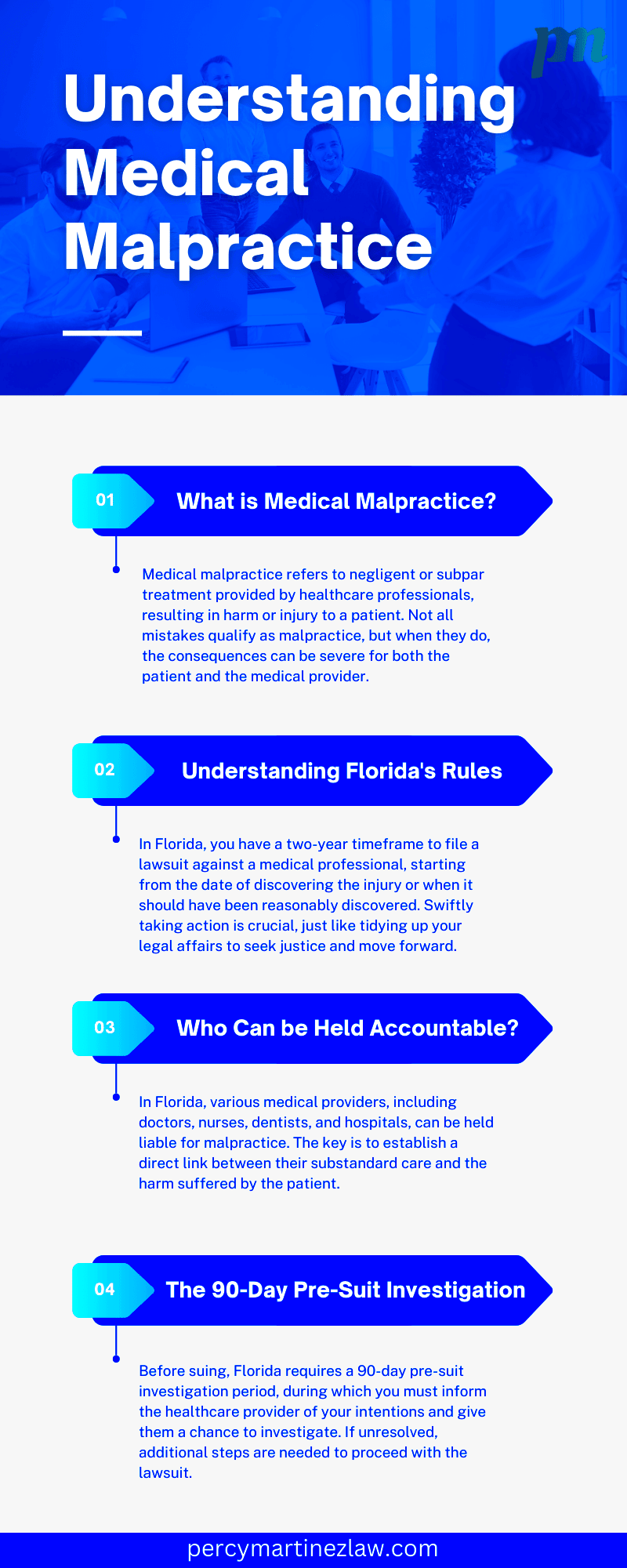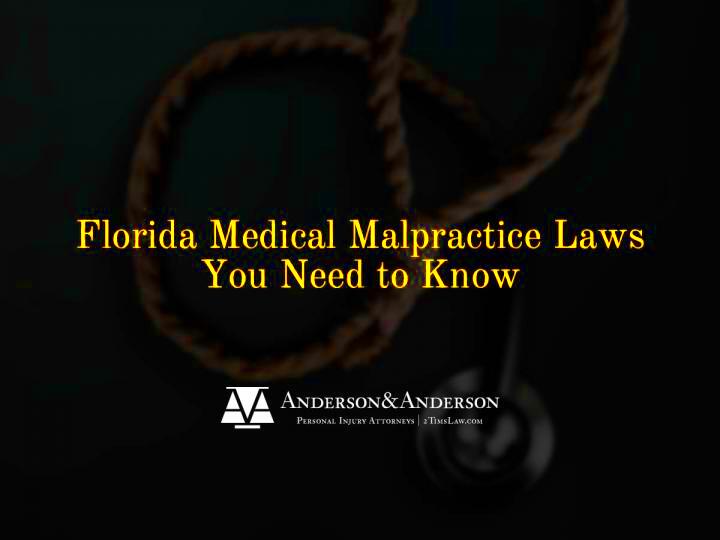Overview of Florida Medical Malpractice Laws
Florida’s regulations concerning medical malpractice were created to offer safety to affected individuals resulting from negligence on the side of doctors and nurses among other healthcare givers. They stipulate actions that should be taken legally before anyone can be compensated in case their physician, practitioner or any other medical personnel fails to provide the expected level of care. It is important for any individual thinking about making such a claim to understand key elements in regards to these laws because they are often complicated and require immediate response.In the state of Florida, the eligibility to file a medical malpractice claim is not open for everyone. Generally, the following parties are entitled to file such claims:Does one need a medical degree to file such an action? An attorney who is familiar with this sort of procedure would be in the best position to discuss such matters.For a Florida medical negligence lawsuit to be successful, the complainant has to show specific fundamental components:It can be difficult to meet each of these conditions; therefore, expertise testimony is frequently needed to substantiate the assertion and describe the healthcare provider’s failure and its effects.
Who Can File a Medical Malpractice Claim in Florida?

- The patient: The individual directly affected by the medical negligence can file a claim.
- Family members: In cases where the negligence results in the death of the patient, family members, such as a spouse, children, or parents, may have the right to file a wrongful death claim under medical malpractice laws.
- Legal representatives: If the patient is incapacitated or unable to file the claim themselves, a legal guardian or representative can do so on their behalf.
Key Elements Required to Prove Medical Malpractice
- Doctor-Patient Relationship: The first step is showing that a valid relationship existed between the healthcare provider and the patient. This means that the doctor was officially treating the patient at the time of the incident.
- Breach of Duty of Care: The healthcare provider must have failed to meet the standard of care expected in their profession. This involves showing that another competent provider in the same situation would have acted differently.
- Causation: It must be proven that the healthcare provider’s breach of duty directly caused harm or injury to the patient. Simply showing that the doctor made a mistake is not enough; there must be a clear link between the breach and the injury.
- Damages: The plaintiff must demonstrate that the injury led to specific damages such as physical pain, emotional suffering, additional medical costs, or loss of income. Without tangible damages, a malpractice claim cannot proceed.
The time frame during which an individual should present their medical malpractice case to the law court, is called the statute of limitations. In the sunshine state, this period is regulated with certain provisions:Making a claim within these time limits is essential. It’s vital to make sure that you bring your lawsuit within the statutory time period as missing it will cause your case to be dismissed, thus it is advisable for one to talk with an attorney as soon as possible if he believes he has a case.Healthcare providers’ errors and omissions can not only harm the patients’ health but also have financial implications. Medical malpractice comes in different forms, characterized by different types of negligence or mistakes, usually referred to as common types.To prove negligence for every kind of malpractice, distinct proof and specialist assertions are warranted. By having knowledge about these classes you will be able to identify any future claims hence seeking the right counsel.In the state of Florida, medical malpractice cases have limits with regard to the amount of damages which can be awarded to plaintiffs. Healthcare providers are therefore shielded from excessive financial responsibility:There might be alterations in these limits as a result of the development of new laws or court cases regarding them. For an individual to know these new laws and their effects on a case, it is necessary that he/she consults with an attorney who understands current limitations.
Statute of Limitations for Medical Malpractice Cases in Florida
- General Time Limit: Typically, the statute of limitations for medical malpractice cases in Florida is two years from the date the injury was discovered or should have been discovered with reasonable diligence. This period is set to ensure that claims are made while evidence is still fresh.
- Maximum Time Limit: Even if the injury is discovered within two years, there is a maximum limit of four years from the date of the alleged negligence. This cap is meant to prevent cases from being brought many years after the incident occurred.
- Exceptions: There are exceptions to these time limits in certain situations:
- Fraud or Concealment: If the medical provider fraudulently concealed the malpractice, the statute of limitations may be extended to two years from the date the fraud was discovered.
- Minor Children: For claims involving a minor, the statute of limitations does not begin until the child turns 8 years old, or until they reach the age of 8, whichever comes later.
Common Types of Medical Malpractice in Florida
- Misdiagnosis: When a medical professional fails to correctly diagnose a condition, leading to improper or delayed treatment. This can significantly impact the patient’s health and recovery.
- Medication Errors: Errors in prescribing, dispensing, or administering medication. This includes giving the wrong drug, incorrect dosage, or failing to recognize harmful drug interactions.
- Surgical Errors: Mistakes made during surgery, such as operating on the wrong site, leaving foreign objects inside the patient, or performing an incorrect procedure.
- Birth Injuries: Injuries sustained during childbirth due to the negligence of medical staff. This can include improper use of delivery tools or failure to monitor the baby’s and mother’s condition properly.
- Failure to Obtain Informed Consent: When a healthcare provider does not adequately inform the patient about the risks, benefits, and alternatives of a procedure, and the patient would have chosen differently had they been informed.
Caps on Damages in Florida Medical Malpractice Cases
| Type of Damages | Cap |
|---|---|
| Non-Economic Damages (e.g., pain and suffering, emotional distress) | $500,000 per claimant, or $1,000,000 in cases involving catastrophic injuries such as permanent vegetative state. |
| Economic Damages (e.g., medical expenses, lost wages) | No cap. Economic damages are intended to fully compensate the plaintiff for actual financial losses. |
One of the vital areas where this group of people operates is in medical negligence cases in Florida. The specialists they work with are called expert witnesses, who have to provide specific knowledge and evidence that help determine if the required standard of care was given and if not then it means that the medical professional’s conduct fell below such a standard. This is how they help:The selection of a right expert witness plays an essential role. They need to possess the required qualifications and have workable skills in that particular branch of medicine which is involved in the case. The result of the trial can be highly affected by his/her reliability, and intelligibility.Here’s a list of commonly asked questions regarding Florida’s medical malpractice to clarify the worries of many:One of the most important things that one should do before thinking of making a claim includes having a grasp on the medical malpractice laws in Florida. This is crucial because these laws help in making sure that victims of medical errors are compensated accordingly; however, it is not easy to move around in this legal world. Some of the major features include maintaining set time frames, showing indispensable parts of the case and understanding how expert witnesses work as well as damage ceilings.If you’re one of the people who suffers from medical malpractice, do consult with a lawyer who has extensive knowledge in the same field because this could lead to your successful reward. A lawyer will collect information for you, recognize experts who can give their opinions on your case and guarantee that all the processes are followed. The only way to get out of the intricate nature of these cases is by being well-informed and getting help from professionals because they know how to handle such issues thus deserving justice plus compensation that you desire most.
The Role of Expert Witnesses in Medical Malpractice Cases
- Establishing Standard of Care: Expert witnesses help define what the appropriate standard of care should have been in a given situation. They explain to the court what a competent healthcare provider would have done under similar circumstances.
- Assessing Breach of Duty: They evaluate whether the healthcare provider’s actions or omissions breached the standard of care. This involves analyzing medical records, procedures, and outcomes to determine if the care provided was below acceptable standards.
- Linking Breach to Injury: Experts connect the breach of care to the patient’s injuries. They provide testimony on how the negligence directly caused the harm or exacerbated the patient’s condition.
- Testifying on Medical Facts: They offer detailed explanations of complex medical facts, making them understandable to the judge and jury. Their testimony helps clarify technical aspects of the case.
-
FAQs About Medical Malpractice in Florida
- What is medical malpractice?
Medical malpractice occurs when a healthcare provider fails to meet the accepted standard of care, resulting in harm to the patient. This can involve errors in diagnosis, treatment, surgery, or follow-up care. - How long do I have to file a medical malpractice claim in Florida?
In Florida, the statute of limitations for medical malpractice claims is typically two years from when the injury was discovered or reasonably should have been discovered. There are exceptions for cases involving fraud or if the patient is a minor. - Do I need an attorney to file a medical malpractice claim?
Although you are not legally required to hire an attorney, it is strongly recommended. Medical malpractice cases are complex, and an experienced attorney can help you navigate the legal process and increase the likelihood of a successful outcome. - What are non-economic damages, and are they capped in Florida?
Non-economic damages compensate for intangible losses like pain, suffering, and emotional distress. In Florida, these damages are capped at $500,000 per claimant, or $1,000,000 in cases involving catastrophic injury. - What role do expert witnesses play in medical malpractice cases?
Expert witnesses are crucial in medical malpractice cases. They provide professional insights into whether the healthcare provider met the standard of care. Their testimony is key in linking any deviation from that standard to the patient’s injury.
- What is medical malpractice?


